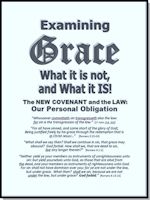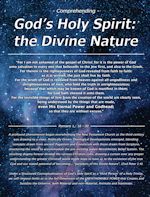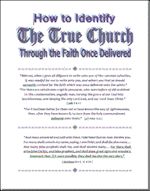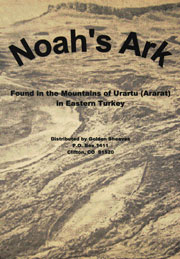
A Surprising Number of Doctrinal Teachings became Passé in the centuries following the Descent of the Early New Testament Church into Apostasy.
You would think that with such a widely accepted authoritative document as the Holy Bible that there wouldn’t be a great a deal of disagreement as to what the original Faith held by the early New Testament Church actually was. And should there be any question, a modern believer could simply peruse the writings of the New Testament and resolve the matter with certainty. At least, that’s the theory.
Then again, we have each of our various denominations claiming that they accurately represent those original beliefs, yet they differ from each other doctrinally in so many fundamental ways. You’d think that ‘the Faith Once Delivered’, theoretically being the common ancestor of all Christian denominations, would be found substantially present in most, if not all of them. Though certain basic elements are substantially the same in many, upon closer examination, comparing the differing doctrinal positions against plain and clear Scripture, we are drawn to the conclusion that many ‘extra-biblical’ ideas have come to play a more dominant role in modern Christian Theology than we might care to admit. In fact, so much so, it would seem that there was a different common ancestor to modern Christianity than the one we might expect! Actually, there was!
True and Original Faith
So, the key question is, does any modern religious creed preserve and teach the fundamental beliefs held by earliest Christians, those who interacted with the original Disciples, and who were taught the words of our Lord by them, without adulteration? And further, should it matter to us?
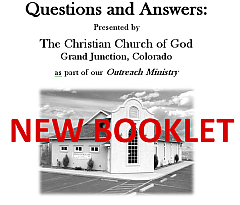
Many, who are discovering the Truths of God’s Word, find what is plainly stated in Scripture to be very different from what they had been taught in the religions in which they grew up. We here, in this presentation, consider many questions received from such individuals, without any reservations against providing answers that at times differ with orthodoxy. This booklet begins by presenting a four page Self Study Guide taking the reader thru many Basic Biblical Teachings, and following that, forty pages of insightful / thought provoking questions submitted by new brethren, many from Africa. It serves as an introduction to the Truths of God’s Word, not taught by all Main Stream religions, but which are Fundamental in explaining God’s Redemptive PLAN for ALL of Humanity. If you have questions regarding any of these references, you may email us at: ccofgod.gj.co@gmail.com or write: P. O. Box 2111, Grand junction, Co 81502
The benediction ending the last-written Book of Revelation warns against two basic tendencies: not adding to and not taking away from the words of its prophecy. Not only is doing either a matter of concern, but also it risks having ones’ name stricken from the ‘Book of Life’. We can also realize from this strict prohibition, that with the addition of the vivid prophetic perspectives of this final New Testament book, there is nothing that needs to be added to the Faith therein delivered. Then, why did later theologians see need to add so much? And why are so many basic concepts, beliefs and practices, common in the early Church, not found in today’s religious belief systems?
So, if we haven’t been concerned with the exact teachings of that Faith, as originally delivered, we do have reason to be. But more than that, if we find the various ‘faiths’ of today to differ from what was commonly believed and practiced in the early Church, how should we respond?
When we talk about that Faith once delivered, as opposed to another, we’re in effect implying that there is a legitimate Truth. Is there such a thing as a “True Church”? Is the concept of a True Church even valid in this enlightened ‘politically correct’ age? (A ‘True Church’ being the one that preserves and practices the beliefs and customs of the early Church as recorded in the Bible.) What should we do with regard to pursuing the question to a reasonable resolution? Is any convenient and ‘worshipful’ belief system just as good as any other? Many are inclined to see it that way. After all, it’s far more agreeable than having to contend for what’s right and true in a world with such divergent opinions as the one in which we find ourselves.
But the underlying question remains, and is itself a matter of Faith, the very issue under consideration. In what do we put our faith, and is any faith format equally acceptable to God? Is the one Faith God delivered, established by His own brutal death and widely witnessed resurrection, of prime importance or is any revised version of it equally valid with respect to attaining the greater promises conveyed with and thru that delivered Faith?
Earnestly Contend!
In the late 60’s AD, Jude wrote in verse 3, “Beloved, when I gave all diligence to write unto you of the common salvation, it was needful for me to write unto you, and exhort you that ye should earnestly contend for the faith that was once delivered unto the saints.” The very issuance of his exhortation strongly suggests that the theological developments of his day were not all good! Men posing as believers were creeping in among the various congregations and perverting the true faith. He then goes on to list two issues that were having negative impact on the theological developments of the time, which issues we’ll consider shortly.
We need to keep in mind that Jude’s exhortation did not put a stop to the theological drift. That drift continued onward with ever increasing fervency. The Church that emerged from the ‘veiled’ first and second centuries was a dramatically different institution from the one we read about in the New Testament, in beliefs, practices and political form. So, what was that Faith once delivered, how does it differ from modern belief systems, and is there any religious organization in this age that preserves its essential elements and practices? To know, we need to know what that Faith was!
Perhaps before we consider the beliefs and practices of the early New Testament Church, we ought to be reminded that the ‘Scriptures’ that they had were what we call the Old Testament. Epistles and Gospels came later, were written and came into wider possession piecemeal, being penned some thirty and up to sixty five years after the Day of Pentecost, and were not omnipresent in all congregations. Some had some, others had others, at least, in that first full generation, which we read about in them. What we see in the New Testament is as much a reflection of their prevalent beliefs as a source of them. By no means was the Old Testament passé in their minds, as it is in most circles today.
What we do find in the New Testament is a Church engaging profound theological issues, how to regard ceremonial practices, what ‘authorities’ to hold as credible, and how to factor into their belief structure and life style such things as faith, grace and works. The highly commended Bereans ‘searched the scriptures daily whether these things were so’, but had only the Old Testament with which to do so. Obviously then, the true Faith can be found in and verified by the Old Testament! Can we say as much for common teachings of the churches of today?
Sabbath Keeping Remained
Touching briefly on some of the most obvious characteristics of the early Church, we see them being consistent Sabbath keepers. In the first twenty years prior to the beginning of the ministry of the Apostle Paul to the Gentiles, the Church consisted nearly entirely of ethnic Jews and Jewish proselytes. For there to have been any suggestion of a change in something as fundamental as this practice would have provoked a similar uproar as we see regarding the first suggestion of dispensing with the practice of circumcision. Absence of mention of even the slightest suggestion of such a controversy strongly suggests there was no such idea introduced in those intervening two to three decades between the cross and the progress of the writing of the New Testament. One significant place where the matter was mentioned, it pointedly affirmed the practice of keeping the Sabbath as regarding the peoples of God. (Hebrews 4) The remention, but that time in opposition to the practice in the early fourth century at the Council of Nicea, reveals that it remained an ongoing practice in some congregations of Christianity and under sufficiently strong persuasion to warrant official repudiation, along with other “Judaic observances” such as keeping of the Fourteenth Passover. [1]
Even the suggestion among evangelicals that the Sabbath was later changed to Sunday is a tacit acknowledgement that it was otherwise originally. What we need to demand is authoritative scriptural proof that such change was Biblically sanctioned; otherwise we must admit that the idea was added! Of course, in all these centuries, no such proof has emerged! In fact, quite the opposite!
Prophecy illustrated in Holydays
Another area deliberately overlooked is the presence of evidence of Old Testament Holydays being observed in the early Church. A prime example is the separate observance of the Day of Pentecost. Had there been no such inclination, the book of Acts would’ve begun very differently! But to know when this day had “fully come”, they had to factor-in the Passover, the Days of Unleavened Bread, the Wave Sheaf ceremony on the ‘morrow after the (weekly) Sabbath’ that fell within them. The Day of Pentecost is a derivative of each and all of these as a culminating event. Referring again to the Council of Nicea in 325 AD, at which critical mention of those who continued to observe the fourteenth Passover [2] shows it to have been a continuing practice thru three centuries, though under increasing suppression, until the apostate authorities banned its observance entirely under threat of the sword. We also see Paul instructing the Gentile Corinthian Church not only in how to properly observe the New Testament Passover, but also admonishing them to keep the Days of Unleavened Bread in sincerity and truth. [3] He and they are also seen marking and observing, in a unique way, the Wave Sheaf dependent Feast of Weeks (Pentecost) on numerous occasions.
But the Church recognized and focused on, not so much their historic significance but their underlying prophetic significance. Paul later wrote of them, referring to Holydays as “a shadow of things to come”, a phrase that could be rendered in modern English as ‘an outline of future events’. Modern theology tends to present this phrase in a negative light, as though Paul was presenting a reason for their not keeping them, where Paul was actually acknowledging that the Church was coming under criticism from strict ‘legalists’ for how they were observing these days!
The later written Gospel of John added a nuance not evident in other Gospels, that of the Holyday seasons in Christ’s ministry. Each of his narrative settings are related to and set in a particular Holyday season. [4]
Who is Jesus?
One of the significant matters Jude mentions in his epistle (verse 4) was the matter of the denial of the Lord God, and our Lord Jesus Christ. In what way is that denial accomplished?
Perhaps the central teaching of True Christianity is the recognition of the Divinity of Jesus, not only as God, but as the God of the Old Testament. Though He is identified in places such as Isaiah 9:6 as the Father of the nation, His mission included making known to mankind the person of His Father, [5] a Being alluded to in certain passages of Old Testament Scriptures, but otherwise not generally known to them. (Psalm 110:1 a prime example, mention of which assured Jesus of a swift and certain death sentence!) Israel’s primary interaction was with and their focus was on their ‘LORD God’, who Jesus claimed was He Himself! [6]
Elizabeth and Mary both acknowledged that He was their Lord and God. (Luke 1:43 & 46-47) Thomas did also. (John 20:28) God Himself calls His Son “God” (Heb. 1:8 quoting Psalm 45:6-7))
Paul in numerous places made a clear point that He was the God of the Old Testament, the Being who God employed to create all things and who personally interacted with the patriarchs and with the emerging nation of Israel. (Hebrews 4:4-8, 1st Corinthians 10:4)
John especially made it clear that He was the one thru whom God created all things. (John 1:3) (see also Ephesians 3:9, Colossians 1:16 & Hebrews 1:10)
Later, apostate theologians such as Marcion [7] put forth the concept that the stern and harsh God of the Old Testament was a different Being than the mild and merciful God of the New! This is a significant conceptual error. Despite being regarded as heretical, that view would later come to enter and impact Christian theology in subtle and profound ways.
Duality of the Godhead
The early Church at first recognized the distinct and separate Persons of the Father and the Son. It was later in the first century that this understanding began to be undermined, partly due to the misconception that was emerging, as mentioned in the paragraph above, posing that the God of the Old Testament was, instead, the Person of the Father, overlaid upon the more prevalent Jewish belief in the numerical singularity of God, rather than their unity [8] so clearly expressed by even Jesus Himself. (John 17:11) As early as the middle years of when the New Testament was being written, this problem issue was emerging. A concept that the elderly Apostle John identified as the spirit of Antichrist! “Who is a liar but he that denieth that Jesus is the Christ? He is antichrist, that denieth the Father and the Son.” (1st John 2:22) These two contrasting phrases define each other! The perception that the Old Testament LORD God was God the Father, and that He is the Only God there is, left doubts as to who Jesus was. Thus the challenge to His true and full Divinity and to His being God’s Anointed (Christ) is raised. The elder John wrote of that developing misconception and the dangers associated with it with pointed clarity! But Jude also identifies it as one of the basic elements of faith that we must earnestly contend for!
Perverted Grace
The other of the two major concerns Jude gives us is the matter of the perversion of grace. In verse 4 he writes: “For there are certain men crept in unawares…ungodly men, turning the grace of God into lasciviousness…” Grace that was being redefined as something other than what it really is! In our ‘earnestly contending’, we are obligated to recognize that there is mis-defined grace out there, and we should be especially attentive to the fact. In its most basic form, that perverted grace is one which justifies or legitimizes a person continuing in sin under the intellectual guise of spurning what they’ve come to label as ‘legalism’! We can see the emergence of that idea in Paul’s reaction to it, where he writes in two places in Romans 6. “What shall we say then? Shall we continue in sin, that grace may abound? God forbid.” (v.1), and,“What then? Shall we sin, because we are not under the law, but under grace? God forbid.”v.15) History proved it to be an idea with staying power, drawn from the depths of our basic (Romans 8:7) natures, that keeps coming thru!
The Resurrections
Another major drift in perceptions involved the laying aside of the doctrine of the resurrections from the dead (Identified in Hebrews 6 as one of seven fundamental doctrines of the Church). Paul made clear the essential nature of this doctrine in 1st Corinthians 15:12-20. Some in his day were introducing the idea that the resurrection was not an essential event, and even past (or passé). 2nd Timothy 2:16-18 also makes reference to the theological contaminant of being dismissive of the resurrection. “But shun profane and vain babblings: for they will increase unto more ungodliness. 17: And their word will eat as doth a canker: of whom is Hymenaeus and Philetus; 18: Who concerning the truth have erred, saying that the resurrection is past already; and overthrow the faith of some.” These two were not referring to the resurrection of Christ, as that event was obviously in the past. If the doubt were of that, Paul would have made reference to the many witnesses to the event. This reference is to the resurrection involving the rest of us. Their error regarded a resurrection of those who are dead in Christ!
The belief system of the early Church was directly dependent upon the attainment unto a resurrection from the dead. No more it seems! (As it’s not regarded as essential to be resurrected in order to go to Heaven!) In fact, how do we integrate the belief system of people ‘going to Heaven’ (or Hell) immediately at their death, with a requirement of a resurrection? What would one facilitate? And, in what form are they to be resurrected? This also was a belief that hadn’t found its way into the early New Testament Church, though it was a common contemporary idea in surrounding ancient societies. (The reader is urged to search the internet with regard to Mithraic and Gnostic beliefs. Mithraism and Gnosticism (Hellenism) was assimilated into even pre-Christian Jewish religion. And where do we think the Islamic terrorists got their ideas about the 72 virgins awaiting them in paradise?)
Righteousness thru Faith
Another significant issue that came to bear as the Church’s theology developed was the issue of the attainment of the righteous condition. Specifically, not the righteousness which was by works, but that which is by faith. The religious environment out of which the Church emerged was oriented to a works mentality, which understandably was the legacy of the Old Testament belief system. One entirely appropriate prior to the sacrifice of God’s True Passover. But thereafter, the dynamics changed.
As the Church, at first regarded as a sect of Judaism, began to exhibit a separate identity, and especially as the Church began to acquire a more Gentile population, matters of the efficacy of ritual performance were reevaluated. The problem for this age is the misapplication of the many direct statements in the New Testament to the efficacy of ceremonial performances as though they’re speaking against God’s moral law, where such statements were intended, rather, to address the ceremonial: ritual performances, both those specified in the Old Testament, and even more so, those extra-Biblical ‘requirements’ manufactured under Jewish reasoning and tradition.
Further complicating this matter is the common consideration of many of the statements in Paul’s writings as being applicable to Jewish law, where it is more correctly applicable to Gnostic beliefs and practices. The books of Colossians and Galatians being prime examples of that! [9]
The other major misapplication is the regard for Paul’s statements as being anti-law, where he was instead only making the point that keeping the law does not effect the remission of sins (the justification process). That poses a great difference. In other words, we can’t earn salvation by performing any righteous moral deeds. The penalty for sin was and is always only death. Nothing we can do after the fact can remove our guilt other than meeting its death penalty, either personally or substitutionally! Few note that Paul, wherever he seems to be negative toward ‘the law’, it’s always in the context of justification. But his regard for the law as the definition of how we ought to live, once having been justified, he’s wholeheartedly positive toward it! [10] A very important distinction missed by most!
Just because future lawkeeping is not effective in rolling back any guilt accumulated in the past, the idea that we are then free to disregard keeping the law is an aberrant perversion of logic. A logic well entrenched in today’s religious climate. This is not new, and explains Paul’s strongest exclamations in places such as Romans 6:1 &15.
Eternal Life
Another subtle shift in thinking from the belief system of the early Church is the matter of the immortal soul. Their belief was that eternal life was something to be acquired, not something always inherent. Even such oft-quoted passages as John 3:16 exposes the fact. It presents ‘perishing’ as our inevitable state, but the acquisition of eternal life as a strictly conditional contrasting alternative. Our believing on Him is that condition, without which we do not have immortality.
The idea of an eternal consciousness after death, in either of two places, though quite common in peripheral religions from ancient times, was not the concept of the early Church. Such passages as 1st Corinthians 15:12-20 reveal their understanding of the state of the dead rather pointedly. “Now if Christ be preached that he rose from the dead, how say some among you that there is no resurrection of the dead? 13: But if there be no resurrection of the dead, then is Christ not risen: 14: And if Christ be not risen, then is our preaching vain, and your faith is also vain. 15: <<i>Yea, and we are found false witnesses of God; because we have testified of God that he raised up Christ: whom he raised not up, if so be that the dead rise not. 16: For if the dead rise not, then is not Christ raised: 17: And if Christ be not raised, your faith is vain; ye are yet in your sins. 18: Then they also which are fallen asleep in Christ are perished. (That word again.) 19: If in this life only we have hope in Christ, we are of all men most miserable. 20: But now is Christ risen from the dead, and become the firstfruits of them that slept.” Profound in its clarity! The resurrection is inclusive of all of us, not just Christ! Paul makes it clear that the dead in Christ are in a hopeless condition IF there is no resurrection from the dead. These are ‘perished’ otherwise, and were not regarded by them as having gone to their conscious eternal reward at that time. They regarded it as a sure eventuality, but strictly dependent upon their being resurrected.
(A side point we should note in this passage is the statement that we are yet in our sins, IF Christ is not raised! It is commonly taught that our sins are absolved by the death of Christ, where Paul shows that to be a PART of the process. We are actually “saved by His Life”. Notice the clear definition found in Romans 5:10 “ For if, when we were enemies, we were reconciled to God by the death of his Son, much more, being reconciled, we shall be saved by his life.” Christ’s ongoing Service on our behalf before the Throne of God in Heaven and our incorporation of His Life within us is essential in attaining eternal life, not just having our sins forgiven! [11] (Hebrews 2:17,3:1,7:25,8:1-2& 9:24) Does your pastor make that perfectly clear?)
The Millennial Kingdom
The prime hope of early Christians wasn’t the idea of going to Heaven, as we might expect. Their focus, rather, was centered in the Millennial Kingdom. The disciples’ question, recorded in Acts the first chapter, is very revealing. “When they therefore were come together, they asked of him, saying, Lord, wilt thou at this time restore again the kingdom to Israel? 7: And he said unto them, It is not for you to know the times or the seasons, which the Father hath put in his own power. 8: But ye shall receive power, after that the Holy Ghost is come upon you: and ye shall be witnesses unto me …unto the uttermost part of the earth. 9: And when he had spoken these things, while they beheld, he was taken up; and a cloud received him out of their sight. 10: And while they looked stedfastly toward heaven as he went up, behold, two men stood by them in white apparel; 11: Which also said, Ye men of Galilee, why stand ye gazing up into heaven? this same Jesus, which is taken up from you into heaven, shall so come in like manneras ye have seen him go into heaven.” Keep in mind that this narrative was written down some three decades after the fact. It reveals that this group of men who spent more than three years under Jesus’ personal tutelage didn’t draw from anything He had said to them that it was man’s destiny to go to or spend eternity in Heaven! It remained their perception, and the perception of the writers, that the key event was the establishment of God’s Kingdom on earth, with Christ present in it, centered in the earthly nation of Israel. [12] The writers didn’t inject any suggestion that it had become a belief system in the intervening decades that it was mankind’s destiny to ascend to Heaven, nor did they in any way amend what the angels declared, that their being reunited with Jesus would occur when He returned in the clouds, in reverse operation of what they’d just witnessed. Jesus or those angels could so easily have said, “You’ll be coming up to join Me shortly!” Instead, what we see written is what Luke thought important to record for posterity!
The thief on the cross stated something that spoke of a similar concept just days before the above event. His insightful request, “And he said unto Jesus, Lord, remember me when thou comest into thy kingdom. And Jesus said unto him, Verily I say unto thee, To day [13] shalt thou be with me in paradise.” To many, this passage in Luke 23 suggests the thief went to heaven that very day. (That raises the question, was Jesus conscious up in Heaven that very day?) But that is viewed from the understanding of our society, not theirs. Luke 19:11 earlier reveals that the common understanding of the first century was quite different. “And as they heard these things, he added and spake a parable, because he was nigh to Jerusalem, and because they thought that the kingdom of God should immediately appear.” ‘They’ being even the general public!
Obviously, their expectation of the Kingdom was not the existence of heaven, per se, but of a new world situation: Christ governing from Jerusalem, as so many Old Testament prophecies reveal. No one, even in our generation, would expect that Heaven would immediately appear! Again, had their perceptions been off base, the writers some three decades later had time to clarify their misunderstanding. But, no, it’s our generation that doesn’t understand what theirs understood.
The thief’s request first acknowledged recognition of Jesus as Lord. Second, it reveals his understanding that this Lord was to have a Kingdom and would establish it in his nation in time. Third, the thief had no time or opportunity to become converted in his situation, so how could Jesus speak with such certainty that he would? Fourth, his request referred to Him coming into His Kingdom, not ascending up to His Father’s.
An Earthly Government
The answer comes with a correct understanding of what the Kingdom of God is, when it is to be, and what that Kingdom’s purpose is. These narratives aren’t referring to the opening up of Heaven for an influx of new destinees. Modern teachings regarding Heaven leave the Truth, as the early Church understood it, out of the picture. As the old hymn: We’ve a Story to Tell to the Nations, says so well, “… and Christ’s great kingdom shall come to earth…” That’s the essential Truth as the early Church understood it! The last writer, John, maintained and presented the same understanding clear to the end of the first century, writing in Revelation 5:10, referring to the Saints, “And hast made us unto our God kings and priests: and we shall reign on the earth.” First century writers, three decades after the crucifixion are seen writing that no man (even David) had ascended into Heaven! Nor was such not their expectation! The idea of going to Heaven or Hell had extra-Biblical origin, a fact easily verified in the historical record.
Absolute Glorification
Another component of the picture of what the early Church understood is the expectation of the form of and state of existence of the resurrected ‘sons of God’. Paul addressed the question rather directly in 1st Corinthians 15 (the resurrection chapter). 21:“For since by man came death, by man came also the resurrection of the dead. 22: For as in Adam all die, even so in Christ shall all be made alive.” Notice here that experiencing death and being made alive are two separate and distinct events!
Continuing… 35: “But some man will say, How are the dead raised up? and with what body do they come? 42: So also is the resurrection of the dead. It is sown in corruption; it is raised in incorruption: 43: It is sown in dishonour; it is raised in glory:it is sown in weakness; it is raised in power: 44: It is sown a natural body; it is raised a spiritual body.<<i>There is a natural body, and there is a spiritual body. 45: And so it is written, The first man Adam was made a living soul; the last Adam was made a quickening spirit. 46: Howbeit that was not first which is spiritual, but that which is natural; and afterward that which is spiritual. 47: The first man is of the earth, earthy: the second man is the Lord from heaven. 48: As is the earthy, such are they also that are earthy: and as is the heavenly, such are they also that are heavenly. 49: And as we have borne the image of the earthy, we shall also bear the image of the heavenly.” His point is clear, we don’t take on the image of the heavenly immediately at death, but at the resurrection. (2nd Cor. 5:1-10 affirms the same.) This is what the early Church understood!
Romans 8 has more of the picture of what the early Church understood: “For I reckon that the sufferings of this present time are not worthy to be compared with the glory which shall be revealed in us. 19: For the earnest expectation of the creature waiteth for the manifestation of the sons of God. 20: For the creature was made subject to vanity, not willingly, but by reason of him who hath subjected the same in hope, 21: Because the creature itself also shall be delivered from the bondage of corruption into the glorious liberty of the children of God. 22: For we know that the whole creation groaneth and travaileth in pain together until now.” Creation itself awaits the glorified Saints to appear and reorient the world condition. These ‘sons of God’ will not be kept in the grave forever.
Much much more could be said regarding the early New Testament Church’s theological understandings. But, we’ll let this much suffice! Ω
Author: Richard Traver, Grand Junction, Colorado. www.goldensheaves.org

